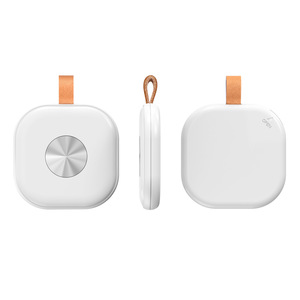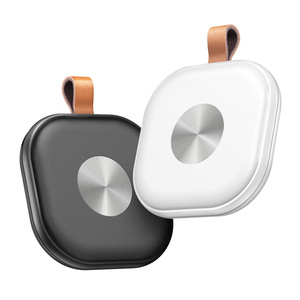(138 products available)




























































































 Ready to Ship
Ready to Ship
















































































































GPS trackers can be classified into various categories based on their features and functionality. Here are some of the most common types:
This is a type of gps tracking device without subscription that is designed to track people's movements and locations. It is widely used by families to track the location of young children or elderly family members. Personal GPS trackers can also be used by hikers and outdoor enthusiasts to enhance their safety by providing accurate location information in case of emergencies.
Pet GPS trackers are designed to track the location of pets such as cats and dogs. They are available in various forms, including collars and tags. The primary purpose of these devices is to help pet owners locate their pets in case they get lost or stray. Some pet GPS trackers also come with additional features, such as geofencing and activity tracking.
Car GPS trackers are designed to track the location of vehicles. They are installed inside the car and are available in various models. These trackers are used for many things, such as tracking stolen vehicles, monitoring the location of fleet vehicles, and providing location data for the car owner.
Asset GPS trackers are used to track high-value assets such as containers, machinery, and construction equipment. These trackers come with long battery life and are rugged to withstand harsh environmental conditions. This makes them ideal for tracking assets that are not frequently moved and are located in remote locations.
Boat GPS trackers are designed to track the location of boats and other marine vessels. They are essential for providing safety and security for the vessel, as well as tracking the location of the boat in the event of theft or emergency. Some boat GPS trackers also come with additional features like weather updates and route planning.
Motorcycle GPS trackers are used to track the location of motorcycles. They are essential for providing safety, security, and theft recovery for motorcycles. Some motorcycle GPS trackers also provide additional features, such as route planning and tracking maintenance records.
Wearable GPS trackers are designed to be worn by people, such as in watches or pendants. They are used to track the location of the wearer. Some wearable GPS trackers also provide additional features, such as health monitoring and emergency alerts.
Specifications
GPS trackers for cars have different specifications, each suited to its purpose. They are as follows:
The connectivity of a GPS car tracker makes it possible to transmit data. The most common type of connectivity is cellular, which allows the tracker to transmit data through a mobile network. This is especially important because the tracker can send the car's location in real-time to a smartphone or computer. Other trackers have satellite connectivity, which enables tracking in areas without cellular network coverage.
GPS car trackers have their battery power, while others are connected to the vehicle's battery. Those that have their battery power can last for days or weeks. However, they require regular recharging. On the other hand, those connected to the vehicle's battery can last for a long time without the need for recharging. They are the best for tracking a car without the knowledge of the driver.
GPS car trackers come in different sizes. Some are small and can be easily hidden inside a car. Others are large. The size of the GPS car tracker affects how easy it is to install and hide. Large GPS trackers are easy to install but cannot be hidden. On the other hand, small GPS trackers are hard to install but can be hidden. Most small GPS trackers are magnetic and can be easily attached to the car.
The accuracy of a GPS car tracker is very important. This is because it enables the tracker to quickly and easily locate the car's position. Most GPS car trackers have an accuracy of 5 meters to 10 meters. This means the car's location can be determined within that range.
GPS car trackers have memory storage where historical tracking data is saved. The size of the memory storage differs. Some have large memory storage, while others have small memory storage. Trackers with large memory storage can save more tracking data than those with small memory storage.
Maintenance
Maintaining a GPS car tracker is important to keep it working properly and to make it last longer. The maintenance tips are as follows:
Users should regularly check the GPS car tracker for any physical damage. Physical damage may be cracks, dents, or signs of wear. If any physical damage is found, the user should contact the manufacturer for repairs.
The user should regularly update the GPS car tracker software. This is important because software updates improve the tracker's performance and add new features. The user should check the manufacturer's website for the latest software update. The user should also follow the manufacturer's instructions to install the update.
The user should regularly check the memory storage of the GPS car tracker. If the memory storage is full, the user should delete old tracking data to create space for new data. This is important because when the memory storage is full, the tracker cannot save new tracking data.
Users with GPS car trackers that have their battery should check the battery regularly. They should ensure the battery is charged. If the battery is low, they should recharge it. This is important to prevent the GPS car tracker from turning off due to low battery.
Users should ensure the GPS car tracker is properly weatherproofed. This is important because weather elements like rain can damage the tracker. They should check the GPS car tracker for any opening. If any opening is found, they should use a silicone sealant to seal it. This will prevent water from entering the tracker.
For users with GPS car trackers that have an external antenna, they should ensure the external antenna is properly connected. They should also ensure the antenna is properly positioned. This is important because the external antenna improves the signal strength of the tracker.
Users should check how the GPS car tracker is mounted. If it is not mounted properly, they should remount it. This is important because if the tracker is not properly mounted, it may move during driving and lose signal.
Consider the specific needs of the business. If the company has a fleet of vehicles, a vehicle tracking device no monthly fee designed for vehicle use and with the ability to monitor the location and driving behavior of drivers may be adequate. However, if the business is looking to track assets or pets, a more versatile GPS tracker with weatherproof features and a compact size can be more appropriate.
Consider the features offered by different GPS trackers. Features like geofencing, real-time tracking, history tracking, and alerts can provide valuable information and help ensure the safety and security of tracked items. Additionally, the business can consider gps tracker without subscription that have extra features like two-way communication or compatibility with a mobile app.
Look for GPS trackers with high precision. The margin of error in these trackers should be minimal to ensure the accurate and reliable location of the tracked items. Buyers can check the specifications of the gps tracking device without subscription in terms of accuracy and even read reviews from other users.
Choose a GPS tracker from a reputable manufacturer that offers reliability. The tracker should be able to connect to GPS signals consistently and also have a robust construction that can withstand harsh environments without failing. Buyers can check the reviews of other customers to determine the reliability of a specific GPS tracker.
Consider the power source of the GPS tracker. Some GPS trackers have rechargeable batteries, while others use disposable batteries. Additionally, some models can be connected to a power source. Depending on the intended use and convenience, buyers can choose a GPS tracker with the appropriate power source.
Consider the ease of installation and configuration of the GPS tracker. Some models are plug and play, meaning they are easy to install without technical knowledge. Additionally, other GPS trackers may require a more complex installation process. Depending on the availability of technical expertise, buyers can choose the most suitable option.
Consider the cost of the GPS tracker. Buyers should choose a tracker that offers value for money. While it is advisable to avoid low-cost products that compromise quality, buyers can also compare the features of different GPS trackers to ensure they are within budget.
Depending on the make and model, here are general steps on how to install and replace GPS trackers.
Go through the manual to understand the type of GPS tracker and its specifications.
Get the necessary tools like screwdrivers to help with the installation.
For the GPS tracker to work properly, pick a good spot to place it, preferably near the window. This makes it receive better signals.
Most GPS trackers come with batteries. Make sure to charge the battery fully before installing it. For those that need wiring, follow the instructions on the manual.
After installing the GPS tracker, do a test to see if it is working, especially on the live tracking.
Q1: How long does the battery of a GPS tracker last?
A1: The battery life of no subscription gps tracker varies significantly. The factors that affect the length of a battery include how frequently the device reports its location and the size of the battery. Devices that report their location more frequently use more power than devices that report less frequently. Generally, a device with a larger battery can last for more extended periods without the need for recharging. Some devices have features such as low-power alerts or power-saving modes that help to increase battery life.
Q2: How often should a GPS tracker be recharged?
A2: The frequency of recharging a GPS tracker depends on how frequently the device is used. If the device is used daily, it will need daily recharging. Some devices come with features that send low battery alerts to notify the user when recharging is necessary. This ensures that the device is always ready for use.
Q3: What is the accuracy of a GPS tracker?
A3: GPS trackers have different accuracy levels. The accuracy of a GPS tracker is usually measured in meters. It is influenced by the environment and the device's quality. In open areas with a clear view of the sky, GPS trackers are more accurate. However, in areas with tall buildings and dense trees, the accuracy is reduced because the device may have trouble getting a signal. The number of satellites the device can connect to also affects its accuracy. A device that can link to more satellites is more precise.